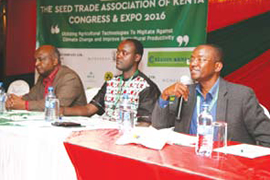Climate Change NOT a Myth

A stakeholders meeting organized by local seed industry players association warned that climate change is a reality and not a myth anymore, and called on farmers to prepare to respond to the phenomenon by putting in place mitigating measures. “Global warming is here with us. The phenomenon of climate change in Kenya is now more apparent than has been before in recent history,” said Mr. Duncan Ochieng Onduu, the Chief Executive Officer, of STAK.
“While Kenyan farmers may for example not be able to agree on the scientific explanation of global warming, one thing that is clear is that they have experienced it first-hand, with the inability to predict the onset of rains unlike the case before. The sun is scorching and the environment unforgiving,” he said.
Experts attended the congress said there is need to utilise coping and resilience mechanisms in order to enhance access to improved seeds that are more adaptable to changing climatic patterns. Dr. Florence Wambugu, chief executive officer of Africa Harvest Biotech Foundation International and Nehemiah Mburu, the programme manager, said that experts need to develop seed varieties that are tolerant to drought and floods, and those that are heat, pest and disease resistant. Additionally, they said there is also need for seeds that are suited to various agro-ecological zones, and those that mature early and are water-efficient.
Addressing the same forum, Raha Kariuki the chief executive officer of Acre Africa, a micro-insurance product designer linking farmers to agricultural insurance through localized solutions to reduce climate risks said.
Farmers in East Africa now have more crop insurance options to help cover them when they are affected by adverse effects of climate change. “Agriculture insurance is not a far-fetched concept since food security depends on seed security and the international seed industry must be able to continue to deliver the quantities of quality seed required for this purpose,” she said.
A regional farmers’ federation called for increased partnership between governments in East Africa and the private sector in implementing climate change adaptation strategies. Climate Change NOT a Myth.
The Eastern Africa Farmers Federation (EAFF) further said that stakeholders should seek for opportunities to scale up work on ‘Climate Smart Agriculture’ (CSA), including access to more technologies and information.
 According to the World Food Organisation (WFO), Climate-Smart Agriculture (CSA) is an approach that helps to guide actions needed to transform and reorient agricultural systems to effectively support development and ensure food security in a changing climate. It aims to sustainably increase agricultural productivity and incomes; adapting and building resilience to climate change; and reducing and/or removing greenhouse gas emissions, where possible.
According to the World Food Organisation (WFO), Climate-Smart Agriculture (CSA) is an approach that helps to guide actions needed to transform and reorient agricultural systems to effectively support development and ensure food security in a changing climate. It aims to sustainably increase agricultural productivity and incomes; adapting and building resilience to climate change; and reducing and/or removing greenhouse gas emissions, where possible.
Stephen Muchiri, the CEO of EAFF said that the federation is seeking support to participate and build more institutional and policy capacity to engage in climate change programmes at all levels.
The trade expo is to attracted over 300 delegates involved in the seed industry, including government officials, development partners, research institutions, universities, agrochemical industry players, processors, machinery suppliers, farmers and the media.
The congress came in the backdrop of the African Green Revolution Forum that was held at the United Nations Complex in Gigiri, Nairobi, which underscored the critical role that agriculture plays in ensuring food security and livelihoods for the continent’s population. The Congress also happened at a time when the UN is urging world nations to ratify the Paris pact on climate change, which was adopted by 195 parties to the UN Framework Convention on Climate Change a year ago in Paris. The agreement calls on countries to combat climate change and to accelerate and intensify the actions and investments needed for a sustainable low carbon future.
Food security depends on seed security